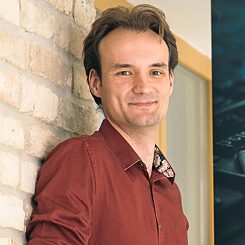Pressure to be successful in the media sector
Let’s shatter the romanticizing around journalism
By PERSPECTIVES NewsroomWith the launch of our latest topic of the month, the PERSPECTIVES editorial team conducted another transnational survey. Together they looked into the question of how the pressure to be successful affects the work culture in the media sector.
The experts' views:

A man covering his face with both hands while sitting on a bench. | Photo: Key Visual 'Survey: How does the pressure to be successful affect the work culture in the media sector?' © Christian Erfurt on Unsplash
Hungary
TAMÁS JAMRISKÓ is a Sociologist and media specialist. Director of the Center for Independent Journalism, editor-in-chief of EPER Radio and lecturer at ELTE University.- The pressure to be successful can be a double-edged sword for work culture in the Hungarian media sector, especially given the scarce resources available to independent media compared to state-supported media. Despite this, there are a number of successful and high-reach independent media outlets operating in Hungary. I see three important attributes in the field in relation to our topic.
- A competitive spirit: high quality and innovative content is produced, leading to a more dynamic and innovative media space. More media outlets are working on issues that government media overlook. They work more like public service media, and can reach many more people than state media by producing material on more topical and widely relevant issues. It is also worth highlighting the motivation that comes from the journalistic values they represent.
Negative effects on well-being and cooperation: the pursuit of efficiency and success can lead to fatigue and burn-out, especially in a labour-intensive field such as media. Mental and physical health is also affected by the changing and unpredictable media environment. With many media outlets in Hungary closing down in recent years, significant changes took place in funding, and less support or advertising is available for independent media.
Focusing on quantity rather than quality: many media outlets are being forced by readership and advertising to produce content quickly rather than maintaining high quality.
Limited resources: the Hungarian media sector has fewer resources than its Western counterparts. This can increase the pressure to succeed with limited budgets and staff. Another important mental attribute is that the government media labels “unfriendly” media and journalists as Western-funded agents, propagandists or fake news makers, and the government and its affiliated actors regularly attack these media outlets and their staff.
Czech Republic
PATRICK HAMOUZ believes in the potential of constructive, sincere and unagitated journalism and tries to live up to this ideal in his work for JÁDU. After studying art history, history and theatre, film and television studies in Cologne and Bonn, as well as Czech language and culture at the Bohemicum of the University of Regensburg, the native Rhinelander was drawn to Prague in 2008, where he worked as an editor for Czech Radio for almost three years. In 2011, he developed the concept for JÁDU as a German-Czech online magazine and has been its editor-in-chief ever since.- Is the pressure that media professionals – and journalists in particular – feel any different than in other professions? Perhaps. After all, journalism is rarely just a profession, but usually a mission. It is a quest for meaning, ideally to create meaning – for oneself and others. This high demand that journalists place on themselves leads to a high level of personal commitment and to pushing themselves to their limits, often beyond them.
It starts with the story that keeps running through our heads because we simply can`t find the right thread. It can be the missing puzzle piece in the argument that makes us feel vulnerable. The research that has come to a dead end that makes us doubt the whole project. The devastating analyses of social and ecological circumstances that make us feel anxious, or – especially in the case of colleagues working in crisis and war zones – the human tragedies and disasters that we see and that emotionally burden even the most hardened of us. Not to mention working environments in which journalists are exposed to repression and threats to life and limb. Such a work culture can lead to serious physical and mental illness.
How do we take the pressure off? First of all, we have to keep reminding ourselves that even the most ambitious and committed contribution will not save the world. Will it make someone think and awaken empathy where there was previously indifference? That would be nice, but it is usually difficult to find out. Where “success” is so difficult to measure, hopefully at least a little meta-reflection sometimes helps: journalists learn new things every day and constantly make new, interesting and often inspiring acquaintances. Who can say that about themselves?!
However, there are still these wounds that we need to put our fingers in: Wages and salaries in journalism often don`t come close to matching the qualified work we do. In addition, we don`t all have the same starting conditions. For example, senior citizens, women and many minorities are still underrepresented in our profession and have to fight for recognition and success more than others. Also these problems require systemic solutions.
Poland
ADAM JÓZEFIAK is Manager of the publishing house of the Kultura Liberalna Foundation. He studies sociology and anthropology at Warsaw University. At Kultura Liberalna he is also responsible for the promotion of events and crowdfunding campaigns.- The need to constantly progress and maximise profits appears in most branches of modern services. In the media, the unhealthy pressure to succeed manifests itself in competition for the reach and promotion of content or the sales performance of copies of magazines, subscriptions and books. Moreover, working in the media is often presented as an opportunity to gain not only financial but also moral capital. After all, journalism is supposed to enable the promotion of one's own name or the realisation of “something good” - and thus journalistic projects have not only a consumer value, but also a more momentous one.
In fact, emphasising the possibility of “personal branding” often means that an employee is prepared to give up some of the financial benefits and even fair recompense for the sake of the social capital he or she obtains. Success in the media industry thus goes beyond economic categories, and the pressure takes on a more personal, social character. In addition, media environments are often characterised by a high entry threshold and hermeticism. The pressure of success without elements of gratification can only lead to frustration in the long run. And chronic stress encourages us to opt for standard and universally proven solutions, which limits our originality and creativity.
How should we respond to this problem? Unfortunately, real success in the face of the mental health crisis, noticeable especially among young people, is the achievement and maintenance of overall psycho-physical well-being. Therefore, our efforts should focus primarily on changing the way we understand “success” and “development”. It is possible to replace hard work and sacrifice with effective work as a tool for achieving a more heterogeneous success, based on a balance of cultural, familial, collegial, or professional achievements. Emerging demands and trends related to the standardisation of working conditions, the normalisation of leisure time or making self-presentation on social media more realistic are the first responses to the need for a new “success”. The real challenge is to redefine “success” in a way that responds to the social realities of the 21st century, which marketing storytelling will not be able to co-opt.
Slovakia
MICHAELA HUČKO PAŠTEKOVÁ – Graduated in aesthetics at the Faculty of Arts, Charles University in Bratislava. In 2011 she defended her dissertation at the Department of Theory and History of Art at the Academy of Fine Arts in Bratislava, where until August 2022 she conducted seminars and lectures focused on the theory of photography, aesthetics and the theory of consumer culture. She is the President of the Slovak Association for Aesthetics. Since 2018, she has been part of the dramaturgy and production team of the Kiosk Dance and Theatre Festival, which has led her to write more about contemporary dance, movement theatre and dance performance in recent years. She is also a member of the band Srnka.- What does it mean to be successful in the media sector? Is it having thousands of readers? Producing dozens of articles per week? Winning a journalistic award? In the traditional media sphere, work culture is also often influenced by the pressure to be up-to-date, to be first. That's what the media has been trying to do since forever, today this pressure is intensified by social networks, where everything happens immediately. The media must (and want to) keep up.
In the independent cultural sector, in which the monthly magazine Kapitál also runs, the ability to pay adequate fees to authors and editorial staff is often a success. So, pressure to be successful has a slightly different meaning in this case. Rather than sales numbers, we are interested in whether our texts will, for example, provoke a broader discussion, whether we can bring a new perspective to familiar topics, motivate people to take action.
- In Slovakia, under the influence of the new government, such radical changes are currently taking place in the field of culture that it will be a success if the independent culture at all survives the next few years, maybe months.
Many cultural institutions, including magazines, may lose financial support, their independence (the struggle to maintain the independence of Radio and Television of Slovakia is currently underway); the government is already trying to influence processes in the private media sector. In recent months, the pressure to be successful has turned into a pressure to survive. Keep your fingers crossed for us to win this battle!
Lithuania
MARIE-LINE DELEYE is Junior Reporter at NARA.- Pressure is a word that most people working in the field of journalism know too well.
Daily juggling between constant notifications, deadlines and stress is demanding, both physically and psychologically. Add on top of it the idea of “success” – and here you are, trying to grasp for air.
With the shift from traditional media to online stories, the workload has changed in newsrooms. Quality reporting is challenged by the number of clicks, views, and the sacred triad of “like, react, and share”.
This competition over time is creating a vicious cycle, forcing journalists to deliver faster stories, with less time for double-checking. On the one hand, everything should be done fast and faster, while on the other – there is no mercy for mistakes.
Furthermore, addressing complex questions about war, conflicts, climate change, social issues and more can only lead to another form of pressure – this time external. Facing outside critics became a sport in journalism, both on social media and in real life. From denigration to persecution, the risk of being muzzled for sharing a different point of view is strong.
- The pressure of reporting not only good but great and unique stories, the pressure of touching people’s lives and making an impact is tightly connected with the need to be “recognized” in this profession. No one is interested in cute and nice little stories, and if you are, your place in the “journalistic hierarchy” takes a hit.
The question remains: what differentiates a “good” journalist from a “great” one? Is it straight-forwardness, or boldness? Fearlessness, reactivity? Or is it simply experience?
Like in every profession, experience can be a factor of greatness. However, which is it—the journalist who has conducted twenty field reports or the one who has spent twenty days in front of a screen gathering data for an investigation? Unfortunately, it’s a mix, and you shall be everywhere, at all times.
The psychological effects in this environment can be hard to handle: overworked hours, stress, burnouts, exhaustion, toxic concurrence, and workaholism are the full package coming together with journalistic work.
So keep your head up and your typing light, folks – you are not alone.
Czech Republic
ANNA LUŇÁKOVÁ studied philosophy at the Faculty of Arts of Charles University, theatre at DAMU and is currently a PhD student at the Faculty of Arts of Charles University. She made her book debut with the prose poem Tři (2020), followed by her poetry debut Jen ztratím jméno (2020), she is also the editor of the anthology Pandezie (2021) and the author of the translation of André Gorz's Letter to D. (2021). She co-founded the collective HERONS VECTOR (per-logeum.com) and the cabaret happening group Nothing is a problem here.- The first thing that comes to mind is, of course, the question of viewership. In an effort to achieve the highest number of views or reads, media outlets often rush not only to produce new content, but also to ideally place it at the time of events and on social media. This sometimes means that instead of quality content, we only read reactions rather than proactive, solution-oriented texts. On the other hand, there is nothing strange about that. But where I sometimes feel real pressure to succeed is when we publish an article that is great but doesn’t get at first much response on social media. Sometimes I’m scared of social media, I am wondering : maybe it just doesn’t have‚ likes but it’s being read? Then the likes and hundreds of views pile up and I’m relieved, almost ashamed that I even bothered.
- Should I measure the success of a publication by the number of responses? Should I look at that when producing an article? So not only the rush but also the response seems to me to be crucial, and not only the quantitative and mass response. It’s easy to create a provocative headline that is guaranteed to elicit reactions or write about what’s trending. But the qualitative response is often invisible. An article can change someone’s life if it brings an important testimony. What is interesting is not necessarily important and what is important may not seem like an exciting issue. And that’s why the media is there, to resist pressure and bring stories to highlight forgotten points of view.










